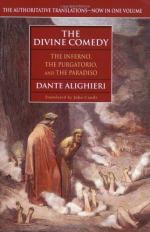Make thyself glad, for thou hast reason now,
Thou wealthy! thou at peace! thou wisdom-fraught!
Facts best witness if I speak the truth.
Athens and Lacedaemon, who of old
Enacted laws, for civil arts renown’d,
Made little progress in improving life
Tow’rds thee, who usest such nice subtlety,
That to the middle of November scarce
Reaches the thread thou in October weav’st.
How many times, within thy memory,
Customs, and laws, and coins, and offices
Have been by thee renew’d, and people chang’d!
If thou remember’st well and can’st see
clear,
Thou wilt perceive thyself like a sick wretch,
Who finds no rest upon her down, but oft
Shifting her side, short respite seeks from pain.
CANTO VII
After their courteous greetings joyfully
Sev’n times exchang’d, Sordello backward
drew
Exclaiming, “Who are ye?” “Before
this mount
By spirits worthy of ascent to God
Was sought, my bones had by Octavius’ care
Been buried. I am Virgil, for no sin
Depriv’d of heav’n, except for lack of
faith.”
So answer’d him in few my gentle guide.
As one, who aught before him suddenly
Beholding, whence his wonder riseth, cries
“It is yet is not,” wav’ring in
belief;
Such he appear’d; then downward bent his eyes,
And drawing near with reverential step,
Caught him, where of mean estate might clasp
His lord. “Glory of Latium!” he
exclaim’d,
“In whom our tongue its utmost power display’d!
Boast of my honor’d birth-place! what desert
Of mine, what favour rather undeserv’d,
Shows thee to me? If I to hear that voice
Am worthy, say if from below thou com’st
And from what cloister’s pale?”—“Through
every orb
Of that sad region,” he reply’d, “thus
far
Am I arriv’d, by heav’nly influence led
And with such aid I come. There is a place
There underneath, not made by torments sad,
But by dun shades alone; where mourning’s voice
Sounds not of anguish sharp, but breathes in sighs.
“There I with little innocents abide,
Who by death’s fangs were bitten, ere exempt
From human taint. There I with those abide,
Who the three holy virtues put not on,
But understood the rest, and without blame
Follow’d them all. But if thou know’st
and canst,
Direct us, how we soonest may arrive,
Where Purgatory its true beginning takes.”
He answer’d thus: “We have no certain
place
Assign’d us: upwards I may go or round,
Far as I can, I join thee for thy guide.
But thou beholdest now how day declines:
And upwards to proceed by night, our power
Excels: therefore it may be well to choose
A place of pleasant sojourn. To the right
Some spirits sit apart retir’d. If thou
Consentest, I to these will lead thy steps:
And thou wilt know them, not without delight.”




